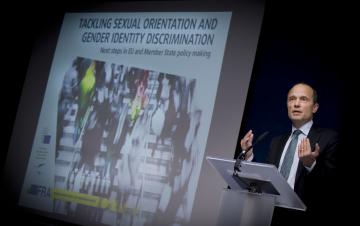A new era for combating discrimination faced by LGBTI people

“The EU has a clear responsibility to promote equality, respect and tolerance for everyone, including LGBTI people,” says Ivan Scalfarotto, Undersecretary of State of the Italian government. “With this important conference the Italian Presidency wants to show its commitment to working with our EU partners to combat LGBTI discrimination and build a more inclusive society for all.”
“Too often, too many LGBTI people face discrimination and hostility for simply being themselves,” says FRA Director Morten Kjaerum. “The tides is changing and there has been positive momentum in many Member States. We must build on this. As the new European Parliament and Commission take office, the time is now ripe to put equality and non-discrimination of LGBTI people back on the EU’s agenda.”
The Italian Presidency of the Council of the EU, in cooperation with the EU Agency for Fundamental Rights (FRA) and the General Secretariat of the Council are hosting the high-level conference “Tackling sexual orientation and gender identity discrimination: next steps in EU and Member State policy making” at the Council of the EU.
The conference aims to support the further development of policy responses by the EU and its Member States to address the fundamental rights challenges faced by LGBTI people in their daily lives, including hostility, hate crime, discrimination and bullying. It builds on the results of FRA’s EU LGBT survey and other studies that revealed the extent of discrimination and hate crime that LGBTI people face regularly at home, at work and in public.
Many EU Member States have moved forward and have adopted legislation and policy measures that have improved the situation of LGBTI people. For example:
- In 2008, 9 Member States limited sexual orientation discrimination to just employment. By 2014, this has dropped to 3 Member States;
- In 2010, 8 Member States consider same-sex spouses as ‘family members’ in the context of free movement within the EU. This is now the case in 18 Member States.
However, in practice hate crime, bullying and discrimination remain major problems for many LGBTI people. Comprehensive concrete legislative and non-legislative measures at the EU and national level are needed to improve the situation so all LGBTI people can live their lives in dignity and with respect.
Over 400 decision makers and fundamental rights’ practitioners from across the EU are gathering to discuss how equality policies in different areas of the EU’s competence can be further strengthened and mainstreamed and what Member States can do to help. The results of such discussions will be a useful contribution to the broader equality and non-discrimination high-level event organised by the European Commission and the Italian Presidency that will take place in Rome from 6 to 7 November.
For further information please contact: media@fra.europa.eu / Tel.: +43 1 580 30 642
Notes to editors:
- The European Union Agency for Fundamental Rights (FRA) is mandated to provide evidence-based advice to EU and national decision makers, thereby contributing to more informed and better targeted debates and policies on fundamental rights.
- FRA has conducted socio-legal research since 2007 on the fundamental rights of LGBT people. See LGBT section for more information. In December, FRA will present a report looking specifically at the rights of transgender people. In 2015, FRA will publish a report looking at the role of public authorities in protecting the rights of LGBT people and an update of its report on legal trends which will also cover the legal rights of intersex people.
- The main results report of the FRA EU LGBT survey will be presented at the event.